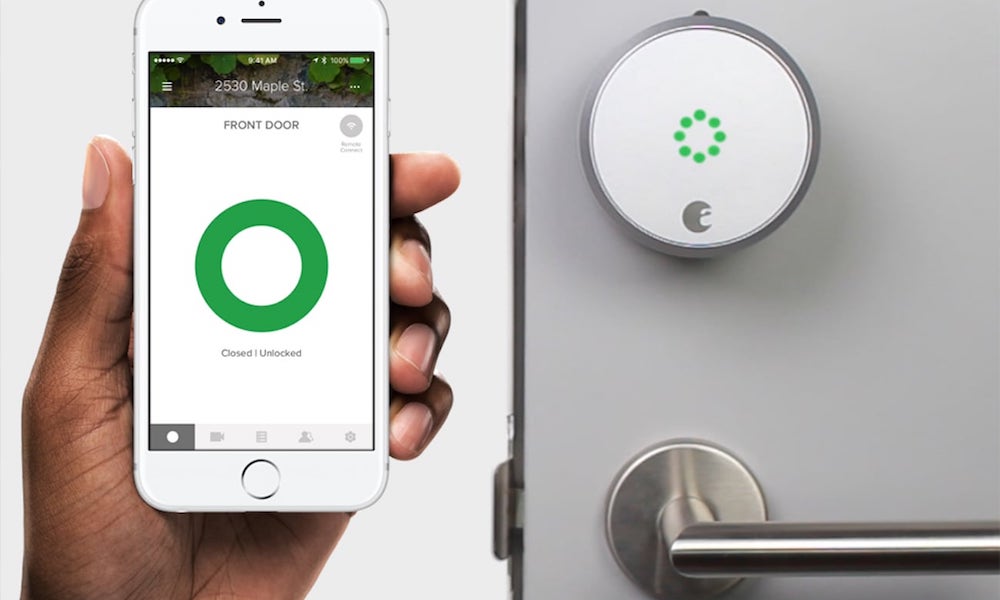Apple Slapped with Smart Lock Patent Infringement Lawsuit

Toggle Dark Mode
Earlier this week, Apple was sued by a company claiming to be the owner of a 2008 patent which covers the technology behind ‘Remotizer®’ — one of the firm’s “remote control electronic deadbolt keyless entry systems.”
In his complaint filed with the Southern Texas District Court, Mr. Mark Kilbourne asserts that Apple “knowingly and willfully” infringed on his “Universal remote deadbolt adapter” patent (U.S. Patent No. 7,373,795). Mr. Kilbourne is the owner of the patent, Richmond, Texas-based, Mr. Butler, LLC., and the sole inventor of the Remotizer® locking system.
“In late 2014, as part of an effort to promote and sell his patented Remotizer® system, Mr. Kilbourne worked to develop a software application that could permit Apple products, such as the Apple iPhone, to be used as a remote control to open and close deadbolt locks retrofitted with the Remotizer® system,” the complaint reads, while going on to add that “Around the September, 2014, time frame, Mr. Butler LLC approached Apple to seek approval to offer the application for its Remotizer® system through the Apple App Store.”
The claim then asserts that sometime within the months that followed, Apple ultimately responded to Mr. Kilbourne’s request with a somewhat unconventional message, indicating that “We began review of the app but are not able to continue because we need the associated hardware to fully assess your app features.”
Apple, of course, was suggesting that it “needed to assess” Mr. Kilbourne’s Remotizer® device — however worth noting, first of all, is the sheerly unusual nature of the request, itself. In the past, Apple hasn’t required its app developers to submit their hardware devices for review when trying to get companion apps approved for distribution on the App Store, however the request is not completely unjustified.
Meanwhile, as Mr. Kilbourne was readying his Remotizer® device to submit to Apple for review (as requested), the company was secretly putting the finishing touches on its then-unannounced HomeKit platform, which is Apple’s proprietary framework designed to permit the interaction between compatible devices and a variety of home automation products — many of which the iPhone-maker offers for sale via its retail and online storefronts.
August Smart Lock
At the core of Mr. Kilbourne’s complaint is the August Smart Lock — described as “a system for remotely opening and closing a pre-existing deadbolt lock,” and referred to in the complaint as a quote-unquote “Accused Product” (meaning that its primary method of operation “infringes upon one or more” of the technologies outlined in the ‘795 patent being contested.)
“For purposes of this Count, the term ‘Accused Products’ refers to the August Smart Lock products sold and offered by sale by Defendant,” the complaint states, adding, in summation, “Defendant has committed, and continues to commit, acts of infringement of the ‘795 Patent at least by selling, and offering to sell, the Accused Products.”
Presently, and for some time prior, Apple has indeed offered the August Smart Lock for sale; and therefore, the complaint states, “Defendant is liable for contributory infringement by contributing to the direct infringement of the ‘795 Patent by purchasers and users of the Accused Products as sold by Apple.”
In other words, the complaint essentially portends that Apple has contributed to the infringement of Mr. Kilbourne’s Patent, simply because it’s allowed the August Smart Lock to continue being sold despite having been informed of the conflict.
No judge has been assigned to the case yet, which was filed this week with the Houseton and Fort Bend office of the Southern Texas District Court.






